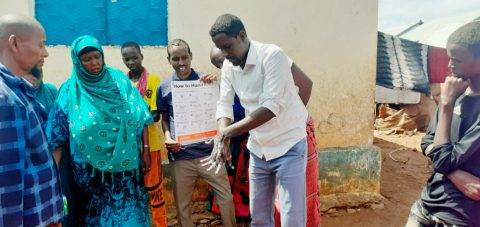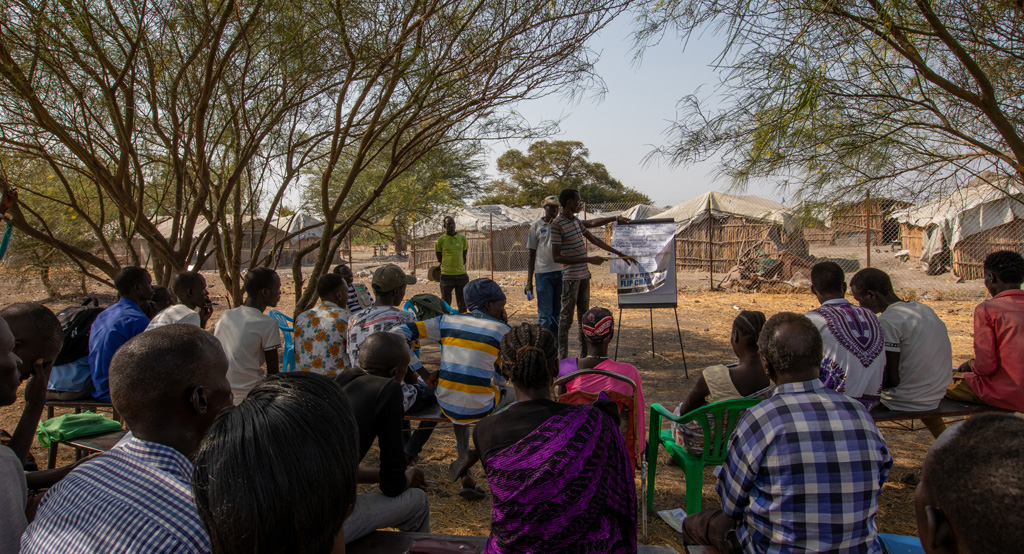An unprecedented disaster looms in East Africa’s fragile countries
Finn Church Aid (FCA) has granted 100,000 euros to prevent the spread of the coronavirus in South Sudan, Somalia and Uganda, in addition to 50,000 euros previously allocated to Kenya.
Finn Church Aid (FCA) has granted 100,000 euros to prevent the spread of the coronavirus in South Sudan, Somalia and Uganda, in addition to 50,000 euros previously allocated to Kenya.
Vulnerable communities across the world are bracing for the impact of a potential spread of the coronavirus.
An essential part of slowing down the pandemic is maintaining sufficient hand hygiene and avoiding human contact but the measures are not easy to apply in for instance refugee contexts. Camps and settlements are densely populated, and people even lack access to soap.
Uganda hosts the largest number of refugees in Africa. FCA partners with the UN Refugee Agency UNHCR in the education sector and the work includes the two largest refugee settlements: Bidibidi in the north and Kyaka in the southwest of Uganda. They are home to over 250,000 refugees.
Uganda has closed schools across the country to prevent the spread of the coronavirus. By early April, Uganda had recorded 44 cases of the COVID-19 disease. The actual number might be higher.
FCA raises awareness on necessary hygiene practices and measures among school children, their families, and teachers. The information is shared through the radio, text messages and posters. FCA also distributes soap and other hygiene products to families and increases handwashing facilities. Within communities, mobilisers also share information through megaphones.
The work is financed with 50,000 euros from FCA’s disaster fund.
If schools remain closed, children from vulnerable families risk severe consequences. Many have access to clean water, food and emotional support only at school. They face a greater risk of violence, child labour, harassment, pregnancy and child marriage when they are out of school.
FCA’s Country Director Wycliffe Nsheka says that FCA also implements precautionary measures to allow schools to open safely when the time comes.
“We are adding handwashing facilities, disinfectants and maintaining facilities, and we prepare to train teaches in psychosocial support”, he says.
A lack of water and a fragile administration increase Somalia’s vulnerability
In Somalia, FCA starts awareness-raising initiatives in its six schools in Baidoa. The town hosts the second largest population of internally displaced people in Somalia. FCA granted 15,000 euros to the intervention.
Somalia had recorded five cases of COVID-19 by early April. The actual number might be higher.
Somalia has also closed all schools. FCA can reach around 3,200 school children and their families through school committees and teachers. Country Director Mika Jokivuori says that FCA arranges campaigns with the help of community mobilisers, distributes posters, gives guidance on hand hygiene and provides families with soap.
“The Baidoa area is particularly vulnerable because of a fragile administration, and a lack of healthcare and water. Schools cannot provide clean water to pupils on a daily basis”, Jokivuori adds.

FCA’s community mobilisers demonstrate handwashing practices and other precautions in Baidoa, Somalia in March 2020. Photo: FCA
Children in the Baidoa area do not have smartphones and connections that allow distance learning. School closures thus further restrict the learning opportunities and well-being of children and youth that are already in a vulnerable position.
When schools reopen in Somalia, FCA will continue its awareness-raising by training teachers and pupils, establish school hygiene clubs and campaign for a safe return to school
Urgent need for precautionary measures in conflict-affected South Sudan
South Sudan’s government has also closed the country’s schools for at least a month, starting March 20th. The country has not recorded a single case of COVID-19 by early April, but the risks are high due to a fragile healthcare system and a challenging humanitarian situation.
Around 1,5 million people live internally displaced within South Sudan following years of conflict, and before the coronavirus pandemic, 7,5 million were already in need of humanitarian assistance. Malaria and diarrhoea are already common diseases, and a spread of the coronavirus would result in unprecedented consequences.
FCA has supported education for over 25,000 children and youth in Mingkaman, Fangak and Tonga, which are located in Lakes State, Jonglei State and Upper Nile State.
Although there are no recorded cases of COVID-19 in South Sudan at this point, there is a desperate need to have interventions in place, says FCA’s Country Director Berhanu Haile.

A group of volunteer teachers participated in FCA’s teacher training in New Fangak, South Sudan in March 2020. Now FCA begins to distribute information on the coronavirus and hygiene practices in schools through teachers. Photo: Maria de la Guardia / FCA.
South Sudan’s government is working with humanitarian aid agencies to support the fight against COVID-19 through awareness-raising and mass sensitization, including people living in internally displaced people camps.
“We must ensure that parents, children, teachers and the wider communities are sensitized and supported with essential lifesaving utilities like soap to prevent the spread of the looming pandemic if cases are recorded at a later stage. Prevention is better than cure”, Haile says.
FCA’s intervention reaches over 21,000 children, teachers and parents. Soap is distributed to 1,500 families. FCA’s disaster fund supports the actions with 35,000 euros.
Preparing for reconstruction after the corona crisis
The number of coronavirus cases and restrictions to contain the outbreak change quickly in different countries. FCA is prepared to modify and adapt its operations according to needs and circumstances, says Eija Alajarva, Head of Humanitarian Assistance.
FCA monitors developments in its countries of operation. Alajarva emphasises that despite the current chaos, we also have to look into the future.
“When the pandemic slows down and restrictions are removed, we have to support particularly children and youth returning to school”, she says.
Children and youth might need psychosocial support and remedial classes because their learning was disrupted
Entrepreneurs in developing countries also need support after the crisis. Movement restrictions threaten the income within the service sector, and the income of farmers usually depends on access to markets.
“Although our programme countries have yet the worst ahead of them, it is vital to prepare for reconstruction to ensure that there are no delays for it when the time comes”, Alajarva says.